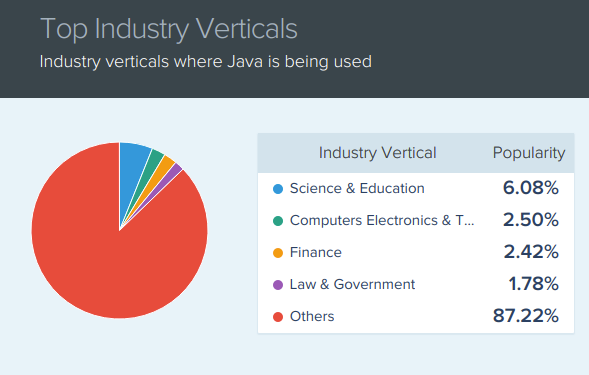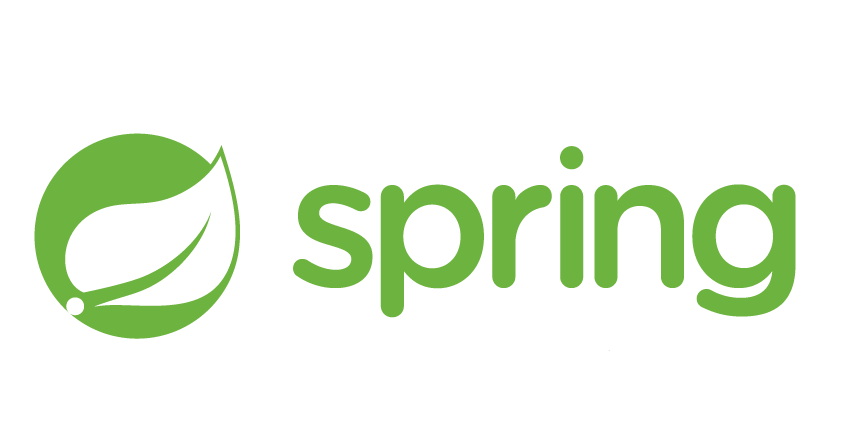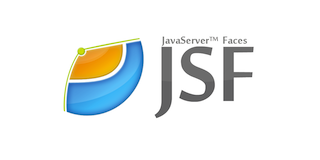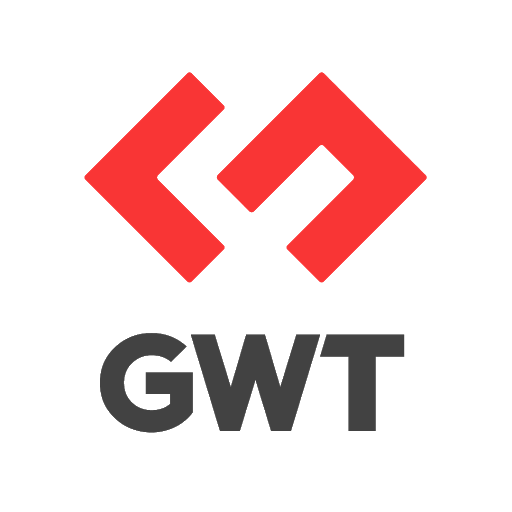Top 5 Java Frameworks for Web Application Development
Join the DZone community and get the full member experience.
Join For FreeIntroduction
Java was released on the 23rd of January 1996 and has celebrated its 24th anniversary in 2020. It has constantly been ranked in the first position according to the TIOBE index. In its 24 year journey, Java has proved itself to be the top general-purpose programming language for custom software development and 1,34,861 websites, like ESPN, SnapDeal, Alibaba, etc., use Java as their primary language.
In the pie chart given below, you can see the usage of the Java language in various industries.

If you want to develop your next web application in Java, then you need to make the right choice while choosing the appropriate Java web frameworks. Are you wondering how you will select an apt Java framework for your project? We will clear your doubts by giving you a list of the top 5 Java web frameworks for web development.

1. Spring
The Spring Framework is a powerful, lightweight web application development framework and is ranked first because of its excellent capability to develop complex web applications that require high performance. The core features of the Spring Framework enable Java developers to create enterprise-level applications with ease.

Spring provides many modules, like Spring MVC, Spring Core, Spring Security, Spring Transaction, Spring Boost, Spring ORM, etc. that are used in enterprise applications. Now, let’s see where is this Spring framework used.
You may also like: A Guide to Spring Framework Annotations.
Advantages
- It provides a lightweight container that can be triggered without using a web server or application server software.
- Spring supports JDBC that improves productivity and reduces the error.
- Spring supports both XML and annotation-based configuration.
- It provides backward compatibility and testability of the code.
2. JSF (Java Server Faces)
JavaServer Faces (JSF) is developed by Oracle for creating enterprise applications, native applications, and web app development. It is used to develop user interfaces for Java-based applications.
It is a stable component-based MVC framework. It has an architecture that clearly and explicitly distinguishes between application logic and representation.

JSF helps developers to create User Interfaces by just dragging and dropping UI components. It makes developing the presentation layer of an application easier, without advanced knowledge of client-side technologies like HTML, CSS, JavaSript.
Advantages
- JSF is an integral part of Java EE.
- It provides excellent tools and rich libraries.
- It allows existing backend Java code to be extended with a web interface without having to change the base application by introducing a new framework.
3. Google Web Toolkit
Google Web Toolkit (GWT) is a completely free, popular, and open-source web framework that helps developers to develop and debug Ajax applications in Java.

With GWT, you can write complex, browser-based applications without having expertise knowledge in frontend technologies like JavaScript.
One of the most awesome things about GWT is that it provides features, such as cross-browser portability, history and management, internationalization, and bookmarking. A lot of Google products are written using GWT, such as AdSense, Google Wallet, and Blogger.
Advantages
- Open-source and completely free.
- Developer-friendly.
- It supports reusability for common web development tasks.
- Google APIs can be used in GWT applications.
- Offers internationalization, cross-browser portability, UI abstraction, bookmarking, and history management.
4. Vaadin
Vaadin is a web application framework used for streamlined Java development. It enables developers to build custom web development services.

A big advantage of this framework is its smooth communication between client and server. Vaadin gives direct access to the DOM from the Java Virtual Machine. Vaadin Flow, a lightweight framework, handles routing communication between the server and client. Vaadin allows you to integrate Vaadin components to any IDE you are using. Vaadin is a cross-platform framework, so there is no need for migrating the code into a different platform.
To work with Vaadin, a developer doesn’t need to have extensive experience with HTML, CSS, and JavaScript.Vaadin translates the Java into markup automatically.
Advantages
- Drag-and-drop support, along with other, outstanding features that simplify the creation of single-page UIs for Java applications.
- Automatic server-client communication with WebSocket support.
- Data binding using MVC or MVP.
- Router with the nested route and parameter support
- Supports JVM languages, like Kotlin and Scala.
- Built-in Spring support.
5. Hibernate
Hibernate is an ORM (Object-Relational Mapping) database for developing a stable framework for Java. Object-relational mapping is used to connect data across two incompatible systems. Hibernate provides better communication between relational database management systems (RDBMS) and Java applications. It is useful if you are working in a complex ecosystem and need to make your data flow seamless.

While working with an object-oriented language like Java, developers face a problem called Object-Relational Impedance Mismatch or Paradigm Mismatch. Hibernate provides you with a framework that helps developers to overcome these issues.
The queries in Hibernate are just like SQL and are called HQL (Hibernate Query Language). Hibernate directly maps Java classes to corresponding database tables and vice versa.
The information about mapping Java classes with database configuration is present in the main file in Hibernate (the hibernate.cfg.xml file).
Advantages
- Powerful cross-database solution.
- Scalable.
- Data can be converted easily.
- Configurable.
EndNote
Knowing about the top frameworks is not a challenge, but to find the most suitable one for your requirements can be one! We came across the most popular and widely used web frameworks of Java. After reading this, you might have a clearer vision of which framework will suit your specific needs. If you are a newbie, I will suggest you to must have a look at this Java Infographic to Learn Java Quickly.
In the end, it is up to you to decide which framework best meets your specific needs (ease-of-use, documentation, support, etc.).
Further Reading
Opinions expressed by DZone contributors are their own.

Comments